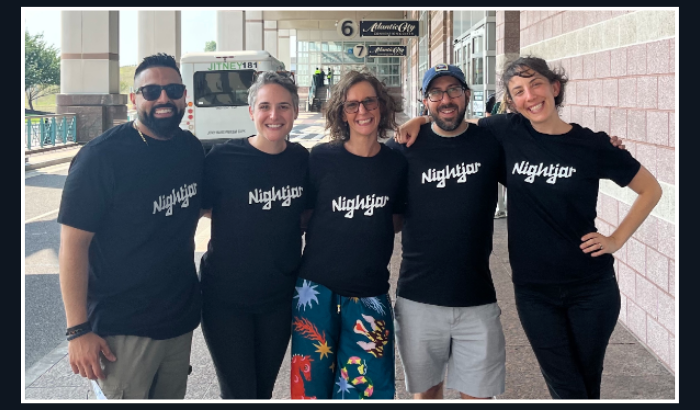
“You’re there to make a difference and provide access to cannabis … and to get this new industry rolling.”
No two experiences in cannabis are alike. But of all the distinct paths that people have traveled to bring plants to the public, the road taken by Francesca DeRogatis truly stands out. From working in the Massachusetts market from just shortly after the dawn of adult-use, to returning to her native New Jersey to co-found her own shop as that state steps up, her story has the makings of a streaming weed-themed homecoming sitcom.
Any Hollywood treatment would likely omit details though, and we asked DeRogatis to speak about some of the less cinematic aspects of working in cannabis at various levels in multiple places. In turn, she broke it all down—from lessons she learned as a marketing director and in the president’s office at New England Treatment Access, to differences between the Garden State and Mass, to the “life-changing” $250,000 grant that her company, Nightjar Cannabis, was awarded by the New Jersey Economic Development Authority.
Our interview with DeRogatis is parsed and excerpted below.
On her Bay State background …
I came up here as an undergraduate in 2005. I really loved it, so I stuck around. …
When I worked for NETA, I came into that organization as the marketing director, and was very quickly promoted up to chief of staff where I worked with [former NETA President Amanda Rositano], my business partner in Nightjar as well as our parent company Soulstar. We were doing community work in Brookline, Mass and I also worked with her on community affairs. At the time, we were opening our third location in Franklin, Mass, so I worked on that process of getting sites and approval and special permits. …
Later, when New Jersey opened up, I took the chance to go back to my home state. I grew up in West Orange, not far from where Nightjar is. I spend about half of my time in each place between Massachusetts and New Jersey.
One big take from the burgeoning NJ market …
Real estate has really been the bottleneck in New Jersey, because 70% of the towns opted out of cannabis, so it was really really tough to find a spot. You’re looking for a needle in a haystack … you have to go to the 30% of towns that were opt-in on cannabis and follow their zoning, so that was an interesting process.
On similarities between NJ and MA …
On the similarity side, the medical operators got first crack [at adult-use] in both. In New Jersey, the medical operators have been selling adult-use since [April 2022]. Until just very recently, this past spring, we have essentially had those operators corner the whole market in New Jersey, so that was very similar to what happened in Massachusetts, where you had folks who were early into the medical side get sort of a head start.
What I learned from going to municipalities in [Massachusetts that transferred to] New Jersey is what a town’s concerns typically are. Things like how, when the rollout happened in Mass, there were long lines in the beginning, and lines wrapped around the block. We learned what it takes to be a good neighbor. I think that was really key. It’s ensuring that you’re giving back to the community as a good neighbor, and contributing to the overall health and wellness of the community—both from an economic development perspective, as well as just enriching the town and showing that you’re not just there to extract wealth. You’re there to make a difference in people’s lives and provide access to cannabis and access to jobs with benefits and to get this new industry rolling.
On differences between NJ and MA …
A very big difference between Massachusetts and New Jersey was that [the latter] allowed for this conditional license type which allowed folks an opportunity to kind of get on the board without holding a property. It gave you this license to go to a landlord and say, I’m serious, I just got my conditional license, I’m the real deal, and you should lease or sell the space to me. A conditional license in New Jersey allows you to get a resolution of support from a township, and to start the process without having site control. That gives you a little bit of time to find a building.
One of the other major differences between Mass and New Jersey is that Host Community Agreements are not required [in New Jersey]. Some towns have Host Community Agreements, which some of them call them Community Benefit Agreements. It’s a little bit of a double-edged sword … challenging in some ways because it’s not like you get your HCA and now you can operate in the municipality. What you have to get in New Jersey is called a resolution of support, and that’s by either the governing body if there is one or if there is not one then the mayor or administrator or governance committee or both. They really left it up to the municipalities; that was similar to Massachusetts, but it’s just a different mechanism for doing that.
On her homecoming …
I have chatted with folks and people who I knew from growing up and it’s been really great. Most of them are pretty open to cannabis; I rarely encounter people that don’t think that what I’m doing is pretty cool or beneficial or just a really interesting career choice. Which is a nice place to be.
Going into New Jersey, it’s a lot more normal now. A lot of folks from New Jersey traveled to Massachusetts, or used to travel to Massachusetts, to buy legal cannabis. And so there was a lot more acceptance in the market in the municipalities that opted in. Some of them are pretty tough still, but we are pretty lucky; Bloomfield is a pretty welcoming place for cannabis businesses. They’re kind of on the forefront just seeing the economic development opportunities. Rise in Bloomfield was one of the first to open in April 2022. I think it’s about being smart, just knowing what folks’ concerns are from a municipal perspective.
And the grant is huge in us being able to do this. Without something like that, like in Massachusetts, it would be a lot harder. The cost, last time I checked, averaged out to be about a million dollars to open a recreational retail store [in New Jersey]. The grant we received was for $250,000, and that was for all 48 folks who got one—they will each receive $250,000, so that’s a quarter of your cost to open up a dispensary.
As for Nightjar …
Nightjar is a recreational store. We’re definitely open to serving patients, and have a lot of respect for the medical program, but Nightjar is about normalizing the [recreational] shopping experience. Why would you want to show your ID at the door and then stand in an area separate [from the main dispensary] only to be led through another door to go into a dispensary? When I buy a bottle of wine I don’t have to do that, and when I pick up a prescription at CVS, I don’t have to do that. It’s really about demystifying it and bringing it to the light and just allowing people to show their ID, walk into the store, and have a good shopping experience.
On the future, social consumption, and the current Mass market …
I can’t wait for social consumption, both in Massachusetts and New Jersey. I just think the regulations have a little bit of a way to go in order to make that business model a reality for operators and to make it something that’s worthwhile for the consumer to do.
When you look at Massachusetts, there hasn’t been a single dollar issued out of the [Cannabis Social Equity Trust Fund], even for loans. But for the grant [that Nightjar received], it’s not funding that we have to pay back. So you can still fundraise, and you can still bring in equity partners, and it gives you a lot of flexibility to do that.
Also, as far as Massachusetts goes, there is the price compression that is happening right now in the industry. But even despite that, our team at Soulstar would love to bring a Nightjar to Massachusetts, and I think that we will do that in the future. It’s just going to be a question of when and how and how you do that in a smart way knowing how much the market has changed.

























